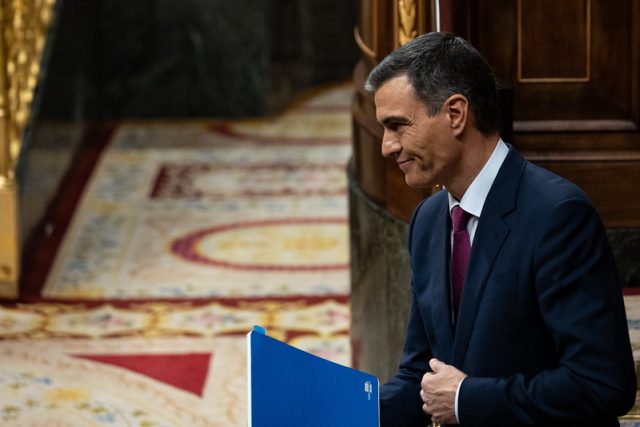
The Socialist Prime Minister Pedro Sánchez has just been re-elected Prime Minister of Spain. Sánchez’s bid was made possible only with the support of the separatists parties of Catalonia and the Basque Country.
Sánchez received more than the absolute majority required to become Prime Minister: 179 out of 350 seats.
The negotiations that have led to Sánchez’s victory in Parliament have received a wide backlash from the citizens and the opposition parties.
Since mid-October dozens of civil society organisations have organised massive protests against Sánchez’s deals with the Catalan separatists, specifically with Junts per Catalunya. Junts is the party of Carles Puigdemont, the separatist leader who organised a coup against Spanish unity and (illegally)declared Catalonia an independent nation in October 2017.
Sánchez agreed to present an amnesty law in Congress that would pardon the convicted Catalan separatists. Their crimes amount to sedition, rebellion, and street terrorism. In exchange, the 7 Puigdemont MPs in the Spanish Congress voted for Sánchez’s bid.
The PSOE-Junts deal also acknowledges that the Spanish government “judicialised politics”, i.e. used lawfare techniques against the Catalan separatist movement.
According to analysts the deal opens the door to a government-sponsored self-determination referendum in Catalonia in the near future.
Hours after the signing the pact, Alejo Vidal-Quadras, an amnesty opposer and and former Vice President of the European Parliament, was shot on Núñez de Balboa Street right in the heat of the capital Madrid.
The Spanish Socialist Party (PSOE) registered the controversial draft law earlier this week, thereby fulfilling Sánchez’s promise to Puigdemont that the bill had to be in Parliament before Sánchez’s re-election debate.
More than 2 million people have gathered all across Spain in never-before seen demonstrations against a sitting government.
The amnesty has been rejected by more than 20 professional associations, civil society groups, and the media, including the Spanish Confederation of Business Organisations, the United Police Union, the Spanish Diplomats Association, the State Attorneys Association, the Professional Association of Magistrates, the Association of State Tax Inspectors, and Historians of Catalonia, the Forum of Professors.
The PSOE’s headquarters in Madrid (and their regional offices in major Spanish cities) have seen demonstrations for more than ten consecutive days. The Ministry of the Interior instructed the National Police to supress these peaceful protests with tear gas, and rubber bullets. International media personalities, such as Conservative news host Tucker Carlson, have joined the protests against the Socialists.
Carlson said “the world needs to know what is happening in Spain.” He argued that the socialists “in an alliance with the separatists” want to get rid of the Rule of Law in Spain.
Carlson warned that a “tyrant” is surging “right in the middle of Europe.”
The General Council of the Judiciary, an independent body that guarantees the independence of judges and courts, called the amnesty “an abolition of the Rule of Law in Spain.” Moreover, the Spanish Supreme Court warned this week that the separation of powers ought to be respected.
In late October, the Conservative Vox party (ECR) presented in the European Parliament a report by its think tank Fundación Disenso. The report titled “Amnesty to the Coup Ringleaders: History of an Illegitimate Constituent Process” lays out all the legal arguments against the Amnesty.
Vox is the only party supporting all peaceful demonstrations, while other parties have distanced themselves from those at the PSOE’s headquarters.
The Spanish Constitutional Tribunal has said in the past that an amnesty law would require a Constitutional reform. Even high-profile Socialists figures—including former Prime Minister Felipe González—have deemed the Sánchez-Puigdemont amnesty deal “unconstitutional.”
Sánchez’s has also placated to the regional-nationalist parties of the Basque Country. He promised them a path towards the “national recognition” of the Basque region and a “bilateral relation” with Spain.
This is the first time in the history of the Spanish democracy that the winner of the election will not govern. The centre-rightPartido Popular (PP) won the most votes in the general elections on July 23, but without an absolute majority in the Congress.
After consultations with King Felipe VI, the Head of State entrusts the leader of the PP, Alberto Núñez Feijóo, to form a government. Feijóo, however, fails to secure enough parliamentary support.
The King then called the parties for another round of consultations and nominated Sánchez.



 Subscribe
Subscribe